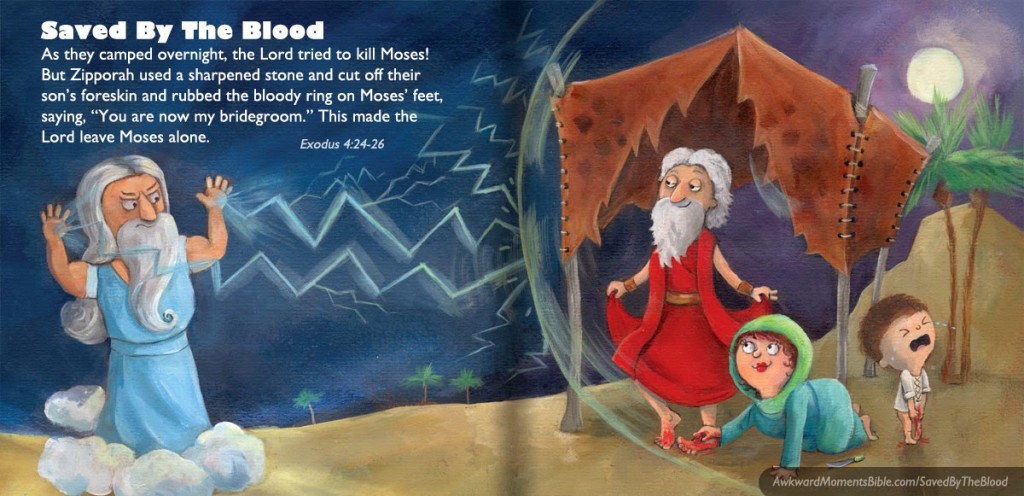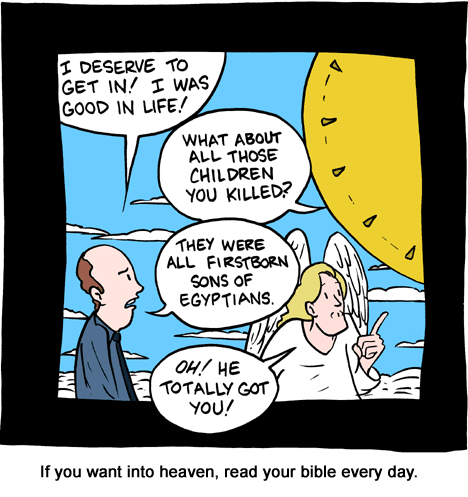Bondage, Passover, and Exodus
Exodus 1–3; 5–6; 11–14
LDS manual: here
Reading
Ch. 1–2: All Joseph’s family moves down to Egypt, where they reproduce with speed that could only be described as Nephite. In just a few hundred years, from the original gang of seventy, there’s millions of them. But there’s a new Pharaoh in town, who enslaves the Hebrews and orders midwives to kill all the boys. Moses escapes. (We’ll see this story remixed into the Jesus legend.)
Ch. 3–4: Moses is raised by Pharaoh’s daughter, but after killing an Egyptian — first making sure no one is watching — he’s forced into hiding. While there, God appears to him in a burning bush.
He explains that he intends to “smite Egypt”.
3:20 And I will stretch out my hand, and smite Egypt with all my wonders which I will do in the midst thereof: and after that he will let you go.
Who the hell listens to a bush anyway? Frankie Boyle, everyone.

Just to be extra convincing, God gives Moses a stick that turns into a snake, and water that turns into blood. And for an encore, by reaching into his cloak, Moses can give his hand leprosy! That’ll do it.
Moses complains that he’s not very eloquent, but God’s like “I know that — who do you think makes people deaf or blind?” Wow, okay, God. Not only that, he explains in advance:
4:21 And the LORD said unto Moses, When thou goest to return into Egypt, see that thou do all those wonders before Pharaoh, which I have put in thine hand: but I will harden his heart, that he shall not let the people go.
God starts to act a bit erratic, though. He inexplicably decides to kill Moses, but it’s Moses’ wife to the rescue!
4:24 And it came to pass by the way in the inn, that the LORD met him, and sought to kill him.
4:25 Then Zipporah took a sharp stone, and cut off the foreskin of her son, and cast it at his feet, and said, Surely a bloody husband art thou to me.
4:26 So he let him go: then she said, A bloody husband thou art, because of the circumcision.
I can see why God would be impressed and leave them alone. He probably put his sunglasses on and said, “You just bought yourself six more months,” and walked away.
Bizarre stuff. Could this be why the manual skips chapter 4?
Ch. 5–10: Moses goes to Pharaoh and gives him a rather ominous first discussion: God Has a Plan for You. Pharaoh won’t let the Israelites go, so after a brief magic contest with Pharaoh’s magicians, Moses smites the place with plagues: bloody water, frogs, lice, flies, dead livestock, boils, thunder and hail, locusts, and darkness. With every plague, God hardens Pharaoh’s heart; he wouldn’t miss a chance to kill some kids.
Ch. 11: God says: ‘Okay, so here’s the plan. We’re gonna blow this place, so first, everyone “borrow” everything you can from your neighbours. Then, I’ll kill all the firstborn Egyptian children to create a diversion. Meanwhile, you guys kill lambs, and smear the blood on your door posts.’
Why did he have them do that? Well, the lamb was a symbol of Jesus, and God liked people to act out things symbolically. So when people say that God is a great scientist or a great engineer… no. Apparently he’s an Arts major. Great. That explains everything.
Ch. 12–14: The Israelites flee toward the Red Sea, with Pharaoh’s army in hot pursuit. God pulls his shenanigans: he blocks them with a cloud, and personally pulls the wheels off of their chariots. Finally, God parts the Red Sea, allowing the Israelites to pass through on dry ground. The Egyptian armies follow, but — kersplash — they’re sunk and no trace of them is ever found.
No, seriously, no trace of an Egyptian army has ever been found in the Red Sea.
Main points from this lesson
No evidence for Hebrews in Egypt
There’s no evidence that a large number of Hebrews were in Egypt during this time.
Linguistics: If Hebrews and Egyptians lived in the same place for four hundred years, then we should expect them to have borrowed words from each other. Sure, they both would have had their reasons not to share vocabulary; Egyptians, because the Hebrews were slaves; Hebrews, because the Egyptians weren’t Hebrews. But we should expect a great number of words to have filtered in. Instead, we find only a few words that could be explained by later contact.
Archeology: If a migration of Hebrews came into Canaan from Egypt after living there for 400 years, we’d expect the pots we find in Canaan to change style suddenly. In fact, we see no sudden change.
There’s a Reddit thread for everything, and this one on the imaginary Exodus looks pretty near comprehensive. Browse if you have the time.
Does it matter if god kills people?
If there’s one thing about children that we can agree on, it’s that they shouldn’t be murdered. Yet the god of the Bible kills kids again and again. Knowing this could have certain advantages:
Yet when I bring this point up with Latter-day Saints (and other Christians), they’re quite unbothered by it. Which is very strange — on the one hand, they’re sincerely pro-life when it comes to foetuses, but they’re frighteningly blasé about this tendency of their god to kill them once they’re born. (They seem to forget that their god only allows about one embryo in five to make it to birth, making God the greatest abortionist of all.)
Mormons that I’ve encountered tend to give the following excuses for God’s predilection for filicide:
- It doesn’t matter because the children get whisked up to heaven where they play with puppies and eat ice cream.
This is a presupposition, not an argument. You can get away with a lot if you’re allowed to magic up a fictional rationale, but it will be unconvincing to anyone who doesn’t share your presupposition.
- It doesn’t matter because everyone has to die sometime.
Even though I have to die someday, I’d rather not be murdered, especially not in childhood. Being killed often entails some kind of pain, and as a moral person, I have this idea that it’s wrong to cause pain unnecessarily.
- It doesn’t matter because God made us, so he gets to destroy us.
This argument reminds me of a passage from Mark Twain’s The Mysterious Stranger, about a boy with strange powers, including the power to fashion live animals from dirt. This is a longish excerpt, but imagine how you’d feel if you saw this scene.
At last I made bold to ask him to tell us who he was.
“An angel,” he said, quite simply, and set another bird free and clapped his hands and made it fly away.
A kind of awe fell upon us when we heard him say that, and we were afraid again; but he said we need not be troubled, there was no occasion for us to be afraid of an angel, and he liked us, anyway. He went on chatting as simply and unaffectedly as ever; and while he talked he made a crowd of little men and women the size of your finger, and they went diligently to work and cleared and leveled off a space a couple of yards square in the grass and began to build a cunning little castle in it, the women mixing the mortar and carrying it up the scaffoldings in pails on their heads, just as our work-women have always done, and the men laying the courses of masonry—five hundred of these toy people swarming briskly about and working diligently and wiping the sweat off their faces as natural as life. In the absorbing interest of watching those five hundred little people make the castle grow step by step and course by course, and take shape and symmetry, that feeling and awe soon passed away and we were quite comfortable and at home again. We asked if we might make some people, and he said yes, and told Seppi to make some cannon for the walls, and told Nikolaus to make some halberdiers, with breastplates and greaves and helmets, and I was to make some cavalry, with horses, and in allotting these tasks he called us by our names, but did not say how he knew them. Then Seppi asked him what his own name was, and he said, tranquilly, “Satan,” and held out a chip and caught a little woman on it who was falling from the scaffolding and put her back where she belonged, and said, “She is an idiot to step backward like that and not notice what she is about.”
It caught us suddenly, that name did, and our work dropped out of our hands and broke to pieces—a cannon, a halberdier, and a horse. Satan laughed, and asked what was the matter. I said, “Nothing, only it seemed a strange name for an angel.” He asked why.
“Because it’s—it’s—well, it’s his name, you know.”
“Yes—he is my uncle.”
He said it placidly, but it took our breath for a moment and made our hearts beat. He did not seem to notice that, but mended our halberdiers and things with a touch, handing them to us finished, and said, “Don’t you remember?—he was an angel himself, once.”
“Yes—it’s true,” said Seppi; “I didn’t think of that.”
“Before the Fall he was blameless.”
“Yes,” said Nikolaus, “he was without sin.”
“It is a good family—ours,” said Satan; “there is not a better. He is the only member of it that has ever sinned.”
…
Two of the little workmen were quarreling, and in buzzing little bumblebee voices they were cursing and swearing at each other; now came blows and blood; then they locked themselves together in a life-and-death struggle. Satan reached out his hand and crushed the life out of them with his fingers, threw them away, wiped the red from his fingers on his handkerchief, and went on talking where he had left off: “We cannot do wrong; neither have we any disposition to do it, for we do not know what it is.”
It seemed a strange speech, in the circumstances, but we barely noticed that, we were so shocked and grieved at the wanton murder he had committed—for murder it was, that was its true name, and it was without palliation or excuse, for the men had not wronged him in any way. It made us miserable, for we loved him, and had thought him so noble and so beautiful and gracious, and had honestly believed he was an angel; and to have him do this cruel thing—ah, it lowered him so, and we had had such pride in him. He went right on talking, just as if nothing had happened, telling about his travels, and the interesting things he had seen in the big worlds of our solar system and of other solar systems far away in the remotenesses of space, and about the customs of the immortals that inhabit them, somehow fascinating us, enchanting us, charming us in spite of the pitiful scene that was now under our eyes, for the wives of the little dead men had found the crushed and shapeless bodies and were crying over them, and sobbing and lamenting, and a priest was kneeling there with his hands crossed upon his breast, praying; and crowds and crowds of pitying friends were massed about them, reverently uncovered, with their bare heads bowed, and many with the tears running down—a scene which Satan paid no attention to until the small noise of the weeping and praying began to annoy him, then he reached out and took the heavy board seat out of our swing and brought it down and mashed all those people into the earth just as if they had been flies, and went on talking just the same. An angel, and kill a priest! An angel who did not know how to do wrong, and yet destroys in cold blood hundreds of helpless poor men and women who had never done him any harm! It made us sick to see that awful deed, and to think that none of those poor creatures was prepared except the priest, for none of them had ever heard a mass or seen a church. And we were witnesses; we had seen these murders done and it was our duty to tell, and let the law take its course.
Ask: How would you feel if you saw someone squash a bunch of people flat, even if he had created them?
Answer: It seems like the kind of thing a morally callous individual would do, and one would wonder if there weren’t something wrong with his moral sense.
Ask: Could God have accomplished his purpose to liberate Israel without killing anyone? If he was able to harden Pharaoh’s heart, could he have softened it?
Answer: If he’s omnipotent, then yes.
Ask: Then why didn’t he?
It’s bizarre and cruel for a god to decide to enact his will in this way, when other avenues are available.
A question on a Facebook thread caught my attention. It’s from Alan Gegax, and I’m sharing it here with his permission:
I was thinking about the God who is presented in the Bible. He had a problem in the beginning when Adam and Eve gained moral knowledge. Part of his solution, introduce death into the world. He had a problem with the world turning to shit. His solution, drown everyone and everything. He had a problem with Jews being kept in Egypt. His solution, kill everyone’s firstborn, then kill the chasing Egyptian soldiers. He had a problem with Jews who needed a homeland. His solution, genocide against the Canaanites. He had a problem with forgiving sins. His solution, kill Jesus.
Has there ever been a major problem in the world that God didn’t solve via murder? I know He’s claimed to heal individuals (though not as often as He smites them), but on large-scale stuff, it kind of seems like murder is His go-to solution. Am I wrong here?
No, I don’t think so. And next year when we get to Revelation, we’ll see how he solves the ultimate problem of evil on earth by killing billions more. This god has a fairly uncreative approach to problem-solving.
Additional suggestions for teaching
The church offers counterfeits
The real lesson manual points to the magicians’ ability to imitate Moses’ rod-snake, and asks:
What are some ways Satan counterfeits God’s power and blessings today?
From time to time, I’d hear in church that Satan had counterfeits for God’s favourite things: Satan’s counterfeit for revelation was divination, the Lord had his church, Satan had counterfeit churches, and so on.
But to say that the LDS Church is real, and other things are counterfeit is upside-down; it’s the church that offers counterfeits.
- Counterfeit family The church tries to build a counterfeit family by co-opting kinship terms (Brother, Sister), referring to the “ward family” with the Bishop as the “father of the ward”, and of course a Heavenly Father and Mother that children are taught to look to and feel love for. Having a family is a normal human thing, but the church trades on this family metaphor in order to turn the feelings one has for one’s family toward itself. I think the goal of the church is not to strengthen the family; its goal is to supplant it.
- Counterfeit way of finding information In science, you learn things by observation, experimentation, and careful control for bias. What’s the church’s method? Knowledge from feels! A burning in your bosom means something’s true. This is epistemic hedonism — if it feels good, believe it — and a disastrous counterfeit that sees people making bad life decisions based on no evidence.
- Counterfeit history We’ve already seen how the church has an alternate version of history that contradicts the evidence that we have from multiple disciplines. There’s no evidence for events like the Creation, the Fall, the Flood, the Tower of Babel, and so on, but Mormon doctrine falls flat without them.
- Counterfeit morality A healthy approach to morality gives guidelines on how to treat other people. When Mormons talk about ‘morality’, what are they talking about? Basically just sex. If you’re engaging in non-church-sanctioned bonking, you’re immoral and unclean, even if you’re doing so consensually and responsibly. If you’re celibate, you can pass for all kinds of morality in the church, no matter how unethical a person you really are. How did they manage to hijack the language this way? This is a one-dimensional view of morality, and it’s a counterfeit.
- Counterfeit healing Mormons try to cure each other of diseases by rubbing oil on each other. In the 21st fucking century. The largest prayer studies have shown no effect, but medical science does.
- Counterfeit authority You have to check out the Benson talk “Fourteen Fundamentals in Following the Prophet“. Here are some of the points:
4. The prophet will never lead the Church astray.
5. The prophet is not required to have any particular earthly training or credentials to speak on any subject or act on any matter at any time.
…
8. The prophet is not limited by men’s reasoning.
Yep, the prophet is right, he doesn’t have to know anything to be right, and he’s righter than people who do know things. Wow — do you think you could convince people to give you an intellectual pass like this? With religion, you can.
The church offers counterfeit love, counterfeit friendship, and in the form of the Relief Society, its own counterfeit women’s organisation. It takes normal human things and subverts them for its own benefit.



30 March 2014 at 4:02 pm
Daniel,
Thanks^13. Another excellent lesson.
My highlights:
“… reproduce with speed that could only be described as Nephite…. no evidence of Hebrews in Egypt.”
The only thing ancient thing about Smith's scriptures was the tradition of making up a fake history.
“… A bloody husband thou art, because of the circumcision.”
I had forgotten this lovely story … shame on me for accepting relying on the manual.
."… Latter-day Saints (and other Christians), they're quite unbothered by it [god killing people]
This is a great psychological mystery … seems to point to a “high-level” unconscious process akin to automatically responding to a threat – to the feeling stirred up in one module tamping down a feeling in another. Without feelings to support what follows from a rational assessment of the facts, bad rationalizations that obviate the threat get a pass. Is this the neurophysiological basis of delusion? Perhaps it's something akin to the Capgras delusion (http://en.wikipedia.org/wiki/Capgras_delusion)
“…a presupposition, not an argument… [it’s a] magic up [of] a fictional rationale”
Isn’t this the definition of theology? And universities award PhDs for this.
"The Mysterious Stranger piece”
Wow. Thanks. Twain was a brilliant..
"Counterfeit … family … epistemology … history … morality … healing … authority
It is interesting how prevalent counterfeiting was in Smith’s day and how this accusation tossed so often between him and his closest associates when the latter defected. Right up there with the adultery charge.
“The Fourteen Fundamentals in following the Prophet.”
Or the 14 "Fundamentalisms." This points to the horrific appropriation of the concept of “virtue” by religions to effectively promote the preservation of the institution at the expense of the individual (at least when push comes to shove). I would think this form of individual control goes way way back. In-group cooperation within a hierarchical organization was essential to survival and human responsiveness/susceptibility to obedience is hardwired by evolution. But in for the modern world we can add such religious “virtues” to the list of counterfeited items.
Thanks again Daniel.
31 March 2014 at 12:00 am
I'd never heard of the Capgras delusion by name — that's wild.
I'm trying to figure out what was at the bottom of my willingness to worship someone who behaved so immorally. Was it a fear that he'd get me, too? Did I figure that he'd only kill people who didn't have a covenant relationship with him, so I was okay? Or did I just black out and stop thinking about it? None of these are very good.
Thanks for your comments. Always gives me a lot to think about.
3 April 2014 at 1:39 am
Brings me back to that Noah's Ark poster.
"Because the largest and most thorough act of genocide makes such a great children's story."
Most people just don't get it – or even think about it – until they are no longer on Noah's (or a god's) team. Some sort of steep moral/empathy discount rate for out-groupers – perhaps hardwired by natural selection.
I'd love to see a psychological experiment in which the subjects' reactions to that poster were measured – perhaps in conjunction with fMRI imagining – and correlated it with some religiosity measure.
By the way, you probably heard about the movie "Noah" coming out. I heard an interview with the director Darren Aronofsky on NPR the other day. Evidently he's had a life-long fascination with the story – but a rather dark one. He said,
"I think most people think of the story as the guy with the long white beard and the animals two by two, and it's a jolly story, a nursery story for kids. But for me, I kind of sympathize with the people who didn't get on the boat, thinking maybe there's wickedness in me and I wasn't good enough. So I always found it as a very scary, a first apocalypse story."
http://www.npr.org/2014/03/29/295926640/in-biblical-blockbuster-aronofsky-rocks-noahs-boat